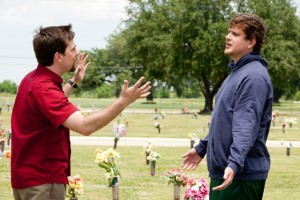
With the Duplass Brothers’ Jeff, Who Lives at Home we see what has become of the “mumblecore” genre as it has reached its inevitable ceiling. Less a filmmaking movement and more an attitude towards filmmaking, mumblecore is an aesthetic with an inherent problem—at least in the case of the Duplass brothers— in that there’s nowhere to grow. I’ve seen certain aspects of mumblecore used effectively exactly once: Last year’s Bellflower, but only because that was a movie that took the category’s tendencies and made them nightmarish. Stylistically—well, there is no style. We’re stuck with a lot of handheld camera work and a movie maddeningly reliant on pointless zooming in and out. And instead of the malaise of white, middle-class twenty-somethings, we get the malaise of white, middle-class thirty-somethings. Any maturity of growth as filmmakers is smoke and mirrors.

Sure, Jeff is gussied up with a bit more professionalism and a better grade of actor, but it’s truly nothing new. This does have the advantage that if you’ve been a fan of the Duplass Brothers’ work in the past, you’ll likely get more out of this film than I do. A lot of critics have thrown around descriptors like “endearing” and “poignant,” so there’s obviously a market here—at least among critics. And while I recognize that this is what Jeff is shooting for, it nevertheless rings false, since whatever ever magic or warmth the Duplass Brothers are attempting to create is either unearned or disingenuous, and far too shallow to be affecting.

The film, of course, revolves around the titular Jeff (Jason Segel), a 30-year-old stoner who lives in his mother Sharon’s (Susan Sarandon) basement. After being harangued by his mother into heading out into the world to run an errand, Jeff instead decides to journey out into some sort of cosmic quest to find his destiny (that this is philosophically anchored in Jeff’s love of M. Night Shyamalan’s awful Signs (2002) is specious to say the least). This meandering soon brings him into contact with his brother Pat (Ed Helms), a blowhard with a failing marriage, who deems himself worthy enough to lecture Jeff on growing up, but who hardly has his own act together.

The bulk of the movie—with a sometimes-nice subplot involving Sharon and a secret admirer—deals with Jeff and Pat attempting to save Pat’s marriage. This is where most of the film’s dramatic weight lies, but it’s too flimsy and emotionally dishonest, since we’re supposed to believe Pat has the ability to completely turn his life around with the snap of his fingers. The same goes for Jeff, who finally meets his “destiny” in a scene that’s far too stagey and unrealistic to work, and which asks for an emotional response it hasn’t earned. This might’ve all worked if the Duplasses had a better handle on whimsy, but instead, we get a movie that claws at sweetness and growth, but is too emotionally flimsy to be believable. Its characters—especially Pat—have a tendency to be unlikable, no matter how quaint the film believes itself to be. As a simple little indie film, this kind of filmmaking would’ve been nice to open a career. But at this point for the Duplass Brothers, they’re just spinning their wheels. Rated R for language including sexual references and some drug use.




WeТre stuck with a lot of handheld camera work and a movie maddeningly reliant on pointless zooming in and out.
I had to restrain myself from yelling “Stop zooming!” at the TV. It was like a Bad Paul Greengrass contest…but with no action.
You boys are young, which makes me feel like I have to ask — have you ever seen any Jess Franco movies? I’m not defending this, but, oy! Such bad zooming.
I looked over all 194 of his directorial credits on IMDB…and, no.
Someone sent me a copy of Lust for Frankenstein. It’s yours for the asking. Honest.